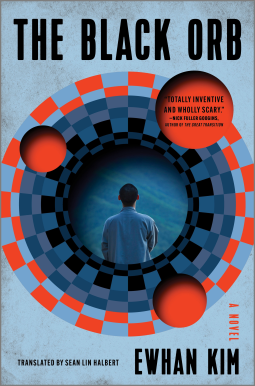The Black Orb, by Ewhan Kim, translated by Sean Lin Halbert, is a fast-paced adrenaline rush of a book in places, but it’s also deeply thoughtful about control, or rather, about reactions to losing control, whether that’s due to surreal danger, panicked reactions, cynical human predators, or toxic male environments. This book, coming out from HarperCollins on Feb. 4, isn’t for everyone, with its weird horror, violence of various kinds, a problematic main character, and mysteries that never really get resolved; however, it absolutely kept me interested and engaged, and presented a lot of ideas to consider.
Per the publisher: One evening in downtown Seoul, Jeong-su is smoking a cigarette outside when he sees something impossible: a huge black orb appears out of nowhere and sucks his neighbor inside. Jeong-su manages to get away, but the terrifying sphere can move through walls, so he’s sure he won’t be able to hide for long. … Impervious to bullets and tanks, the orb splits and multiplies, chasing the hapless residents of Seoul out into the country and sparking a global crisis with widespread violence and looting.

Jeong-su isn’t a hero, but he doesn’t think of himself as a bad guy, either. His initial funk is replaced by a determination to get to his elderly parents and try to protect them, and he actually helps a couple of random strangers along the journey. But although he thinks of himself as someone who’s learned to be tough and do unpleasant things to survive and succeed, he also sees himself as powerless in many situations, from the compulsory military service of his youth to mandatory after-hours socializing as a businessman. Later, when he’s trapped for a long time with another, younger man, one incident (after a long period of stress) turns him into a bully passing on abuse and trying to justify the toxicity he has absorbed. And anyone in a Prisoner’s Dilemma with him should be deeply concerned!
I don’t know what the prose of The Black Orb is like in the original Korean. In this translation, it’s vivid and direct, fast-paced where it should be, conveying uncertainty and grim claustrophia well in other chapters.
Aside from a couple of brief passages in the beginning, showing how other people react in the beginning of the crisis, everything is told from Jeong-su’s point of view (third person past tense), but the reader hears from various other people through him as he wanders and looks for his parents. Particularly interesting is a community of refugees he encounters, who have figured out a way to work together to safeguard themselves from the black orbs, but they are very secretive about their methods and discourage outside communication. (The media and governmental broadcasts stop soon after widespread absorptions disrupt society, and many people distrust the broadcasts anyway and put their faith in soothing rumors instead.)
Later, crowds are frantically searching for scapegoats, although people don’t put it that way. Their reasoning is that if they can find someone immune to the orbs, they can get an explanation for what’s been happening, and thereby protect themselves, and then maybe life can go back to normal, for the survivors. But what they really want is someone to blame, and to hurt to repay their sufferings.
Nobody finds out what the black orbs are, or why they do what they do, although some characters spend time researching black holes. In some ways, these mysterious antagonists almost might as well be dragons who suddenly appear and start eating people. So it’s tempting to classify this book as more of a surreal horror novel rather than science fiction, or even science fantasy. But other than the orbs, everything feels very grounded, and the explorations of personal choices by the hero-victim-villain and other individuals, and portrayals of various group-dynamics reactions (cooperation, censorship, rumor-mongering, panic, and violence) do have a lot of relevance for the present time and near-future scenarios. However one thinks this book should be categorized in publishing terms, it’s extremely well crafted, exciting, and darkly intriguing.
Content warnings: Inexplicable menace, deaths, robberies, mob violence, personal violence, sexual assault (fleeting mentions), explicit language.
Comps: John Wyndham’s The Kraken Wakes.
Disclaimer: I received a free review eARC from the publisher via NetGalley.







